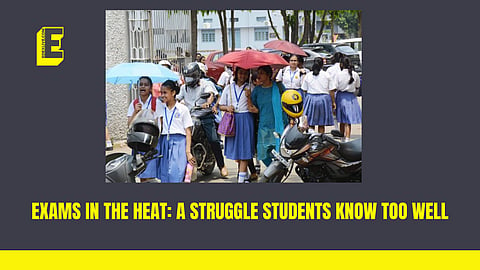

While students across the country are already burdened by the stress of exams, they now face a new, unforgiving rival — rising temperatures. They are forced to appear for board exams and entrance exams, which are typically scheduled between March and June, i.e. throughout the entirety of summer.
To them, the heat during board exams has become more than just an inconvenience; it’s a serious detriment to their health and their prospects in the exam. With many centres lacking proper cooling facilities, students are expected to perform their best under tough physical conditions.
“I was sweating the whole time,” Yashika, a Class X student told EdexLive. Danika Khanna, a Class XII student also added, “By the time I reached the exam hall, I was already tired.”
Making it through the heat
The heat of the summer is not just felt by students appearing for exams is not just felt by them — their parents also feel it.
In fact, for many parents, the battle begins before the exam even starts. Early mornings are spent making sure their children stay hydrated and cool. Some even drive long distances to ensure their children aren’t exposed to the blazing sun.
Lalitha Agarwal, a parent, said, “We try our best to keep them comfortable, but once they’re inside, it’s out of our hands.”
The situation is harder for students who rely on public transport or have long commutes. The heat often leads to headaches, dehydration, and loss of concentration during the actual exam. “Yes, I've felt completely tired and extremely dehydrated post the exam due to which I was not able to perform at my best either,” said Kesar Sitlani, a Class X student.
When asked about solutions, students and parents had plenty of suggestions. The most common one? Change the exam months.
Many believe that shifting the board exams to cooler periods like February, March, or even November would help students perform better. Others suggested better infrastructure at exam centres — more fans, shaded waiting areas, water stations, and even air conditioning if possible.
Interestingly, the idea of online exams was also suggested by students. While some students supported it for comfort reasons, most were sceptical. “Online exams might not be fair for everyone, especially those with poor internet access,” said Samiha Rana, Class XII student
What needs to change
It’s clear that while students are expected to adjust and cope, the examination system hasn’t fully adapted to seasonal realities. In a sub-tropical country where summer temperatures can soar beyond comfort, holding major national exams during peak heat seems more of a tradition than a thoughtful choices.
Parents and students alike are calling for change — not out of laziness or resistance, but out of concern for health, fairness, and performance. After all, no one should have to fight the weather while fighting exam nerves.
